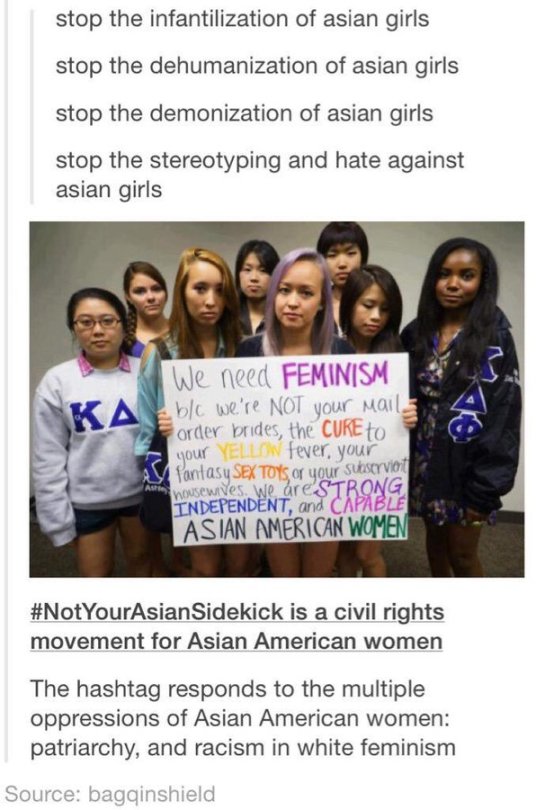#notyourasiansidekick
Photo
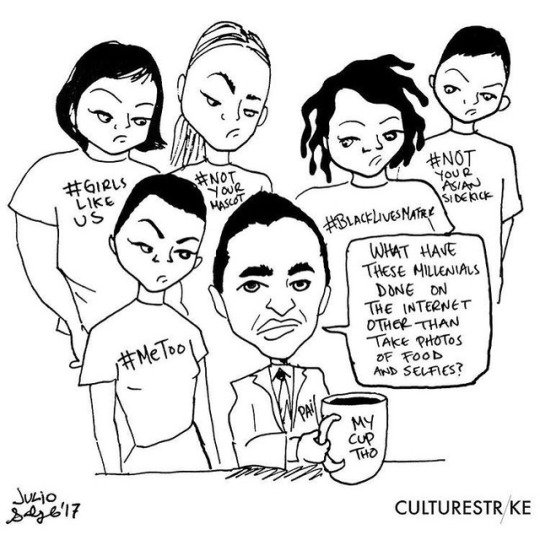
Honored to write for @culturestrike on #netneutrality and even more thrilled to have my writing illustrated by the incomparable and amazing artist @juliosalgado83 . . Internet access is a right. It is imperative to the way we communicate, run businesses, educate ourselves, fight, organize and mobilize. According to Camille Fassett with Freedom of the Press Foundation, "net neutrality is the principle that internet connections are not filtered, restricted, or manipulated based on their content. In the United States, that principle is enforced by a set of rules designed to ensure that neither internet service providers (ISPs) nor the government can tamper with the delivery speed or accessibility of certain data." At CultureStrike, not only are we a tight-knit network of cultural strategists, artists, writers, and filmmakers, we rely on the open internet to reach our communities, locally, nationally, and internationally. But the most affected by this change in accessibility to internet access are communities of color, which relates directly to our access to health, job, and educational resources. . . As many people on social media have already commented on the decision, an open internet goes far deeper than access to social media, sharing memes and funny videos. It enables us to witness social justice movements and resistance our mentors and elders dreamed about such #ArabSpring, #BlackLivesMatter, #NotYourMascot, #MeToo, #GirlsLikeUs, #BindersFullofWomen, #NotYourAsianSidekick, #BlackGirlMagic, and countless others. It allows for collaborators to co-create artwork and tell stories in radically different ways that affect change. It bridges communication between families separated by the diaspora. It gives an aspiring, young, queer trans writer and artist the opportunity to see videos and access content meant to uplift and inspire them to move forward in their practice. The internet is the last digital terrain we can, collectively, keep from being colonized. Let’s continue to battle for the free and open internet. . . Visit http://bit.ly/2CCOTWu to learn more!
#notyourmascot#blacklivesmatter#metoo#notyourasiansidekick#arabspring#bindersfullofwomen#girlslikeus#netneutrality#blackgirlmagic
2 notes
·
View notes
Photo
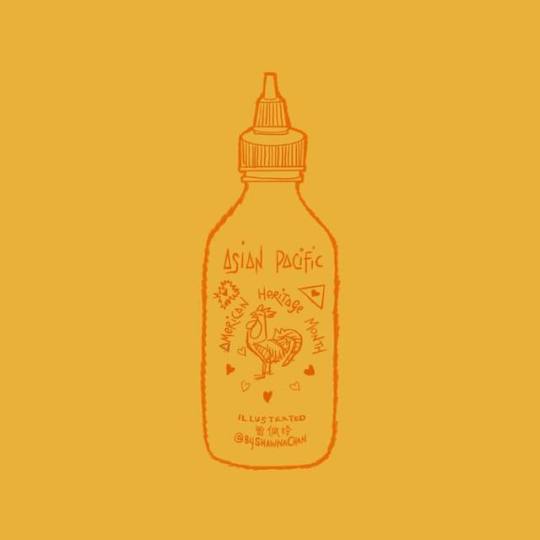
It’s Asian American Pacific Heritage Month! 💛 HELP us celebrate fellow badass Asian womxn creatives, makers and small businesses for the month of May. Support your local girl gang and tag them in the comments👇🏼 to be featured in our stories. . 🌶A peek at what I have been cooking up for #AAPHM 🤫 . . . #asianpacificamericanheritagemonth #自己人#asianpacificheritagemonth #aapi #asianamericanpacificislanderheritagemonth #asianamericanpacificheritagemonth #intersectionalfeminism #siracha #woc #asianamercians #asianheritagemonth #asianartist #womenofcolor #notyourasianfetish #notyourasiansidekick #feministaf #asianempowerment #asiancreatives @aliwong #asiancreativenetwork #yellow💛 #asianhotsauce #immigrantsmakeamericagreat #ilovehotsauce #representationmatters #diversityandinclusion #supportyourlocalmakers #supportyourlocalgirlgang #byshawnachan #bloodygirlgang (at Chinatown, San Francisco) https://www.instagram.com/p/Bw7h75-hB7-/?utm_source=ig_tumblr_share&igshid=cl9bwkl91ik4
#aaphm#asianpacificamericanheritagemonth#自己人#asianpacificheritagemonth#aapi#asianamericanpacificislanderheritagemonth#asianamericanpacificheritagemonth#intersectionalfeminism#siracha#woc#asianamercians#asianheritagemonth#asianartist#womenofcolor#notyourasianfetish#notyourasiansidekick#feministaf#asianempowerment#asiancreatives#asiancreativenetwork#yellow💛#asianhotsauce#immigrantsmakeamericagreat#ilovehotsauce#representationmatters#diversityandinclusion#supportyourlocalmakers#supportyourlocalgirlgang#byshawnachan#bloodygirlgang
0 notes
Photo
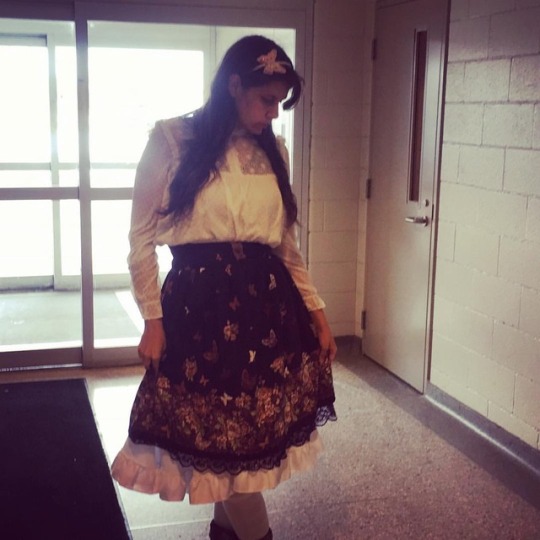
On #internationalwomensday, a number of local business posted pictures of their female employees on their feeds...and I noticed an important absence...the absence on international women! We need to start doing the work to ensure that healthcare, financial security and personal safety are rights afforded to ALL women (read: not just the white ones) and it starts by showing a diverse face to our communities. #intersectionalfeminism #shopblackowned #feminism #feminisme #womenshistorymonth #humanrace #humantrafficking #humanrights #equality #povertytrap #internationalwomensday2019 #solidarityisforwhitewomen #iamawoman #iamalsoawoman #notyourasiansidekick #blackgirlmagic #racismisreal #racismispoison https://www.instagram.com/p/BuwV5NEFxHJ/?utm_source=ig_tumblr_share&igshid=1b8y0532ginae
#internationalwomensday#intersectionalfeminism#shopblackowned#feminism#feminisme#womenshistorymonth#humanrace#humantrafficking#humanrights#equality#povertytrap#internationalwomensday2019#solidarityisforwhitewomen#iamawoman#iamalsoawoman#notyourasiansidekick#blackgirlmagic#racismisreal#racismispoison
0 notes
Photo
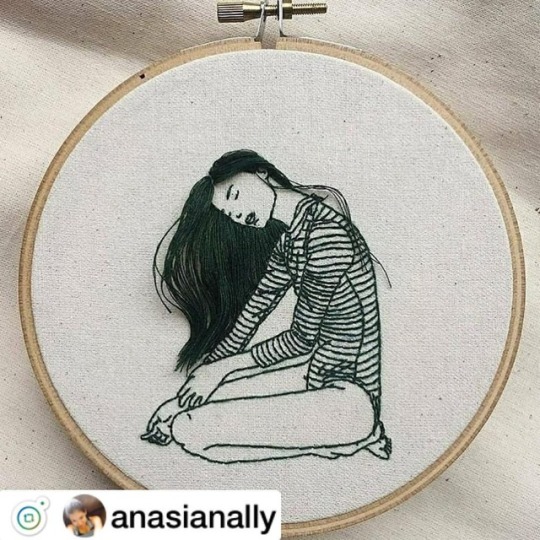
#repost follow @anasianally I love these 💙 —> scroll for more —> • • • • • #representationmatters #asianrepresentation #notyourasiansidekick #yellowperil #yellowperilsupportsblackpower #asianamerican #asianunity #stophollywoodwhitewashing #peopleofcolor #asianfeminist #womenofcolor #refugeeswelcome #asianpower #blacklivesmatter #protectlgbtasians #crazyrichasians #praisintheasian #equalrights #sheenaliam #quarterjapanese #japaneseamerican #bodypositivity https://www.instagram.com/p/BsROKLqhb_9/?utm_source=ig_tumblr_share&igshid=it2ahovq9dsw
#repost#representationmatters#asianrepresentation#notyourasiansidekick#yellowperil#yellowperilsupportsblackpower#asianamerican#asianunity#stophollywoodwhitewashing#peopleofcolor#asianfeminist#womenofcolor#refugeeswelcome#asianpower#blacklivesmatter#protectlgbtasians#crazyrichasians#praisintheasian#equalrights#sheenaliam#quarterjapanese#japaneseamerican#bodypositivity
0 notes
Text
Thank you for FIVE YEARS as Managing Editor of WU, Hoi-Fei Mok ’10 (@alifeofgreen)!
For the last five years, Hoi-Fei Mok ’10 has served as the managing editor of Wellesley Underground. Fei will be leaving this role as they have a lot on their plate fighting for climate justice as Sustainability Manager for the City of San Leandro and as a local organizer in the API Community. It has been an amazing five years and Fei and their vision will be missed. Fei made the blog what it is today: a space for us to be human, imperfect, honest, and cheer each other on. Fei was vital in spearheading Wellesley Underground into a space that organizes and helps workers and students at the college who are fighting for their rights against the college.
As a thank to Fei and all their amazing work and advocacy for Wellesley Underground the Wellesley College Community, the editors at Wellesley Underground have compiled a list of our favorite pieces and interviews by Fei.
We love you Fei!

WU chats with Wellesley College Food Service Union about current negotiations
Chatting union organizing with Hailey Huget ‘10, Georgetown Alliance of Graduate Employees (GAGE)
Climate Justice Resources by Hoi-Fei Mok ‘10 (@alifeofgreen)
Building Solidarity with the Black Community: A Guide for API Allies by Fei Mok ‘10 (@alifeofgreen) and Shelly Anand ‘08 (@shellypolitik)
#NotYourAsianSidekick: Lessons in Solidarity Building by Fei Mok ‘10 (@alifeofgreen)
Taking Social Change Action with Class Privilege by Fei Mok ‘10 (@alifeofgreen)
Wellesley in the World: Melbourne, Australia by Fei Mok ‘10 (@alifeofgreen)
W in Art: Hoi-Fei Mok ‘10 (@alifeofgreen)
Wellesley Outside of Work: Hoi-Fei Mok ‘10
1 note
·
View note
Photo

Today, we’re presenting our second post from @danielkisaac, wherein he discusses what it’s like being Asian American and dating. This is not unique to the LGBTQ+ community, but has been widely covered this year by @grindr, @scruffapp, @chappyapp, and many others. Curious to see what Daniel experiences online and in person? Look no further. ⠀⠀⠀⠀⠀⠀⠀⠀⠀ “Where are you from?” 👆🏽This may seem like an innocuous question, but to a person of color this implies that they do not belong here or could not possibly be from here and thus becomes a microaggression. I was at a bar earlier this year and someone asked me this question while tugging at their eyes. ⠀⠀⠀⠀⠀⠀⠀⠀⠀ “Normally not attracted to Asians but you are fucking hot!!” 👆🏽This is not a compliment. Have you met every single Asian in the world? How do you know that you are not attracted to an entire race of people? ⠀⠀⠀⠀⠀⠀⠀⠀⠀ “My last boyfriend was Korean. I love your food.” 👆🏽This is an immediate red flag. Danger, Will Robinson. GTFO! ⠀⠀⠀⠀⠀⠀⠀⠀⠀ “No fats, femmes, or Asians.” 🖕🏽This is not ok. This fat shames. This is sexist and signals internalized homophobia. And this is racist. Also, if you try to add “just a preference” to any statement like this, just know that these are not preferences--these words are an act of violence. ⠀⠀⠀⠀⠀⠀⠀⠀⠀ Real talk. We are already a marginalized community that has rights we fought so hard for, which are now being threatened by our current state of affairs. Why are we spending any time or energy hating on or oppressing each other, consciously or not, when there is enough hatred and violence for our community from the outside? #GetBehindBespoke #DoctorsOrders #LGBT #Instagay #Health #Wellness #Gay #SexEd #Racism #InternalizedHomophobia #PeopleOfColor #TeamBenKim #NotYourAsianSidekick #NotTheSame #BeingAsian #Inclusion #Diversity #Asian #DanielKIsaac (at DTLA) https://www.instagram.com/p/Bn81eNvg01g/?utm_source=ig_tumblr_share&igshid=7jly5aawkwdc
#getbehindbespoke#doctorsorders#lgbt#instagay#health#wellness#gay#sexed#racism#internalizedhomophobia#peopleofcolor#teambenkim#notyourasiansidekick#notthesame#beingasian#inclusion#diversity#asian#danielkisaac
0 notes
Photo

We talk today with @savage_slaughter about Dr. Who! Dive in and get you some! Links can be found on biopage or geekygirlsnightin.libsyn.com #whovian #allonsy #Newbie #podernfamily #notyourasiansidekick #podcasts #trypod (at Indianapolis, Indiana) https://www.instagram.com/p/Bn67grtlAKp/?utm_source=ig_tumblr_share&igshid=gg3chrhxvrk3
0 notes
Photo
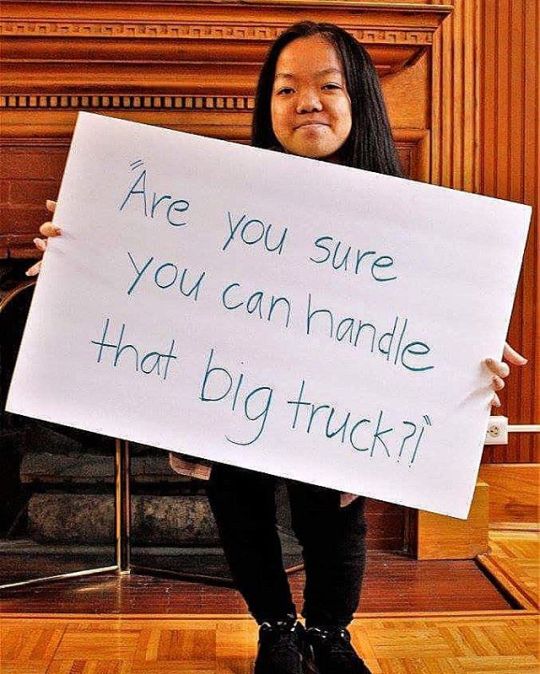
"Being a little person, Asian and female is hard for someone to be taken seriously. I always got doubted and told I couldn't do it. Anything really, people doubted or judged. Getting my license and driving a big truck was my first "in your face, I can do anything you can do" moment. No one ever expects someone like me to hop down from the driver’s seat but it doesn't stop them from trying to question my ability. Yes I do drive a big truck. Yes I can drive perfectly fine. Yes you can take your criticism and doubt somewhere else."- Rachel Taketa #neverthelessshepersisted #ThisIsWhatDemocracyLooksLike #LetLizSpeak #shepersisted #futureisfemale #nastywoman #elizabethwarren #genderstereotypes #resist #TheRisistance #feminism #equality #fuckpoliteness #littleperson #intersectionality #notyourasiansidekick (at Portland, Oregon)
#neverthelessshepersisted#resist#thisiswhatdemocracylookslike#genderstereotypes#notyourasiansidekick#equality#fuckpoliteness#elizabethwarren#nastywoman#therisistance#littleperson#intersectionality#futureisfemale#shepersisted#letlizspeak#feminism
0 notes
Text
My coworker and I are working on a display for Women’s History Month at my library and we’re trying to center it around hashtags relating to feminism. We already have:
#Fem2
#GirlsLikeUs
#NotYourAsianSidekick
#BlackGirlMagic
#MasculinitySoFragile
#PrettyPeriod
#WhyIStayed
#RapeCultureIsWhen
#YesAllWomen
#AllMenCan
#YouOKSis
#AddWomen
#ToTheGirls
#EverydaySexism
#FatPositive
#HeForShe
#Microaggressions
#Intersectionality
#MeToo
But we’re looking for more! Specifically ones dealing with POC and trans feminist issues. We’d appreciate some help!
104 notes
·
View notes
Photo
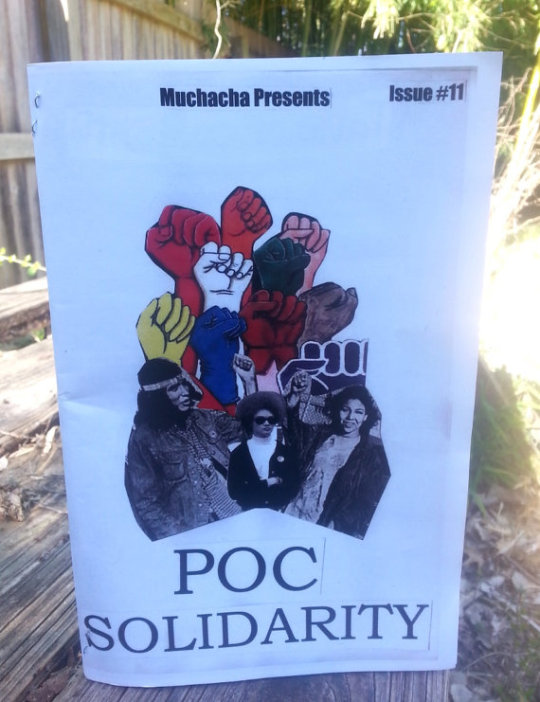
Muchacha Fanzine, Issue #11 “POC Solidarity”
Since the birth of the Black Lives Matter movement in 2013, it has been inspiring to see the beautiful display of love and support demonstrated around the world. More and more POC (people of color) are realizing that our freedom is tied to each other's—we are not free until we are all free. But that acknowledgement also comes with confronting the oppressive behaviors that are still happening in our communities.
Through visual art, essays, poetry, fliers, articles, photography, and collages, the contributors discuss the ways in which people of color promote unity and navigate accountability. Topics include confronting anti-blackness, transgender women of color facing police violence, men of color fighting misogyny, light skin privilege, #notyourasiansidekick, cultural appropriation, and more. Together, we need to realize our true power and know that our power is only stronger if we are united.
Relevant right now as much as ever. Check out a copy here!
29 notes
·
View notes
Text
#NotYourAsianSidekick
The hashtag #NotYourAsianSidekick was the 2013 birthchild of writer and activist Suey Park. It was created based around the idea of white feminism, which is feminism that centers around the struggles of white women and choses to ignore the oppression faced by women of color. Park also wanted to bring attention to the struggle of Asian women in the entertainment industry. It is hard as it is for women in general to break into this field, but to add being Asian American on top of that and it only makes it that much harder. This hashtag was interesting to me because as someone who calls themselves a feminist, it was eye-opening to learn about what that means for women of other races.
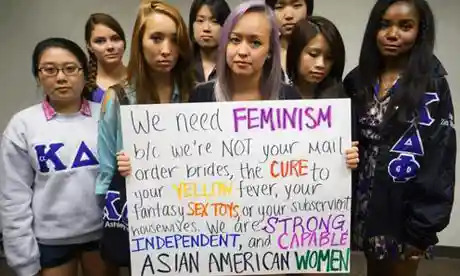
https://www.theguardian.com/commentisfree/2013/dec/17/not-your-asian-sidekick-asian-women-feminism
Many people have created similar hashtags spin-offs that are attempting to portray a very similar message such as #NotYourMascot, and #NotYourTonto. However, similarly to how All Lives/Blue Lives Matter has been created to undermine the Black Lives Matter movement, there have been hashtags created by white feminists in attempts “deny complicity in whiteness” (Kim). We have seen time and time again through our readings in this class how symbols of power for people of color have been continuously undercut by white people. Hashtags like #NotYourWhiteFeminist, claim to be helping the feminist cause, but instead take away visibility from the hashtag #NotYourAsianSidekick and henceforth take away a voice from Asian women.
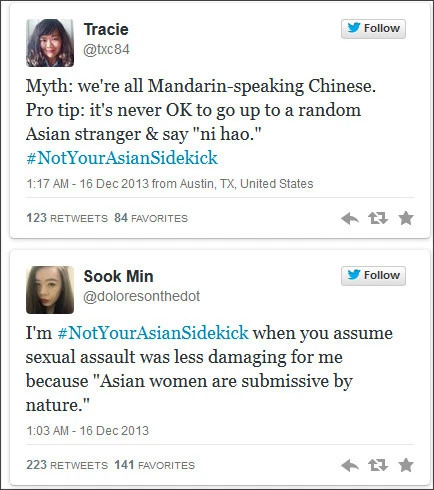
https://redthreadbroken.wordpress.com/2013/12/19/notyourasiansidekick-today-tomorrow-or-ever/
This hashtag made me reflect heavily on Peggy McIntosh’s “Unpacking the Invisible Knapsack.” Specifically, her point that “I can turn on the television or open the front page of the paper and see people of my race widely represented” (McIntosh). It seems to be common theme especially for Asian women to have very few people who look like them being portrayed in any form of media.
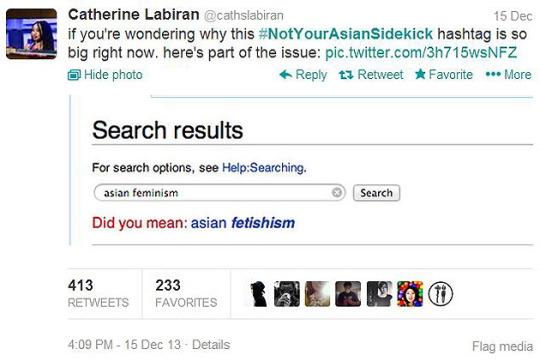
https://redthreadbroken.wordpress.com/2013/12/19/notyourasiansidekick-today-tomorrow-or-ever/
I think that this hashtag, and the conversations that have come from it, clearly demonstrate that feminism has a long way to go before it is truly intersectional. I also think that it is important, as a feminist, to reflect upon ourselves and our own actions to realize whether or not we are working towards equality for everyone, or just the people who look the most like us.
Kim, Yoonj. “#NotYourAsianSidekick Is a Civil Rights Movement for Asian American Women | Yoonj Kim.” The Guardian, Guardian News and Media, 17 Dec. 2013, www.theguardian.com/commentisfree/2013/dec/17/not-your-asian-sidekick-asian-women-feminism.
0 notes
Text
Activism & Culture Jamming
For my fellow activists, protesting and activism are the only opportunities we have to make change. It’s the only way to be heard.
But what actually is activism?
“The use of direct and noticeable action to achieve a result, usually a political or social one”
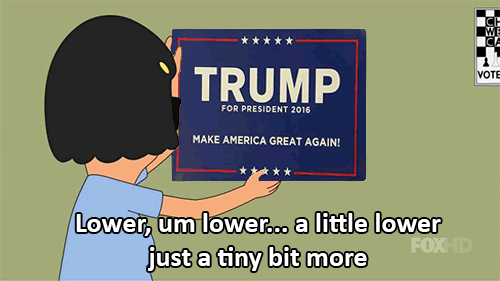
Activism is action that goes beyond conventional politics, typically being more energetic, passionate, innovative, and committed. In terms of politics, it includes election campaigning, voting, passing laws, and lobbying politicians.
Action outside of politics include neighbourhood organising, protest marches, and sit-ins.
My favourite example of activism occurred when Stormzy, British rapper and overall icon, used his performance at the 2018 Brit Awards to call out the government and Prime Minister, Theresa May, on a live broadcast for their lack of economic support and blatant disregard to the victims of the Grenfell Tower fire. He also critiqued the Daily Mail for their racism and stereotyping of grime music for “glorifying drugs”.
It’s not often that celebrities use their platforms to make a difference, especially on such a large scale and at a prestigious event. That’s why this is a memorable example of activism because Stormzy goes beyond the conventional type of protests we usually see, using this event to call out those who run our country, in front of the world to see.
(Sorry, of course I had to add a British element to fit the blog theme. No regrets.)
But, if you want a cultural experience, here is the clip of Stormzy being a hero.
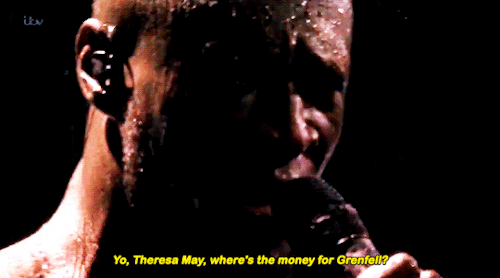
Anyways, lets get back on track.
Generally, it is believed that the new social media era has helped cases of activism succeed. Through the introduction of social media, media activism has emerged, greatly benefiting those without a voice.
Social movements are the core of many forms of media (e.g. technologies, genre) that contest dominant power. Media activism is a prime example of collective communication practices that challenge the status quo, including established media.
An example of media activism is the #CancelColbert case.

As a late-night show addict, I was slowly warming up to Colbert. Until one fateful night.
In 2014, Colbert posted an offensive tweet:
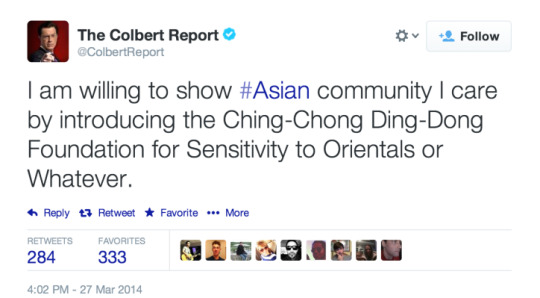
Understandably, reading this tweet may be confusing so here is some context:
The tweet was posted in response to Dan Snyder, owner of the American football team Washington Redskins, who had offered to set up a foundation for Native Americans.
The Redskins have been accused of culturally appropriating Native American culture by using a Native American name and symbol for their logo when American football is a non-native sport, so Snyder made this offer to make amends.
Colbert mocked this offer by creating his own foundation (‘Ching-Chong Ding-Dong Foundation for Sensitivity to Orientals or Whatever’)
This is referencing an earlier episode, one where Colbert been captured making a racist parody of the ‘comedic’ Ching Chong Ding-Dong character.
Here is an accurate representation of myself walking into the Colbert party thinking he was unproblematic:

This problematic tweet drew the attention of freelance writer and activist, Suey Park.
She gained prominence in 2013 for creating the #NotYourAsianSidekick Twitter campaign which spread to over 60 countries thanks to the power of social media. The campaign was designed to critique the portrayal of Asian American women in pop culture.
In response to Colbert’s tweet, Park coined the hashtag #CancelColbert, and this blew up so much that Comedy Central (the show’s network) tweeted an apology and Colbert himself apologised on his show.
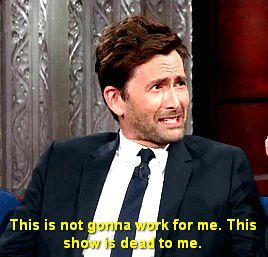
This is a prime example of ‘culture jamming’, a type of activism coined by Mark Dery.
It is the act of using existing mass media to comment on those very media themselves.
Culture jamming is a form of resistance to popular culture - it uses elements of social media, e.g. memes or hashtags, to critique the norms and practices of social institutions or to point up the flaws, inequalities and unethical elements of consumer culture and capitalism.
The #CancelColbert hashtag uses this idea to spread awareness of Colbert’s behaviour and to organise a group of like-minded to collectively boycott ‘The Colbert Report’.
So, to anyone who thinks the youth are ruining their lives on social media, you can see here that we are using our platform to better our future rather than ruin it.
#mda20009#activism#protest#culture jamming#stephen colbert#cancel colbert#stormzy#brit awards#social media#twitter#media activism
0 notes
Photo

This is 100% me, ain't no catfish. If y'all need proof my Insta is @eurythmicc (Tumblr messaging is shit) but I'm FILIPINO and proud 👏👏 Born and raised but moved to the States. I'm honestly such an outcast lmao. Having to speak languages others can't speak is like good but bad in a way. When others talk in a language I'm just there looking clueless like??? And then when you feel like you're the only Asian at school makes me cri so when I see other Asians I'm like yeeESSS LET'S GO EAT RICE AND TALK ABOUT OUR CULTURE. But then there are times where I get considered something else and people look shook going like but you don't look Asian? I'm highkey tired of these stereotypes 👀👀 Half is true and half isn't but not all of us can do math. When I hear them it makes me wanna karate kick them so hard your ancestors will feel it. But anyways I'm proud to be Asian 🇵🇭 #notyourasiansidekick #praisintheasian
0 notes
Text
180MC reading responses
The introduction to ‘Suspensions of perception: attention, spectacle, and modern culture’ outlines the key questions one asks about the effect that this digital age can have on our minds, and in this particular case, our ability to pay closer attention to detail. To not just see something with our eyes but to comprehend it in full and to take the time to observe it for all that it is without the help of our current technological advances. For example, now that we have autocorrect, we no longer have to pay attention to our own spellings and often find ourselves misspelling words more often than before when we can no longer turn to the help of autocorrect. Crary says he is going to focus on the idea of “reception in a state of distraction” with the intention of focusing on the time period that is roughly between 1879 and the early 1900’s and he says this is in order to “attempt to establish both, why attention became a decisively new kind of problem in the nineteenth century”…”and why it became inseparable from philosophical, psychological and aesthetic investigations” which points already to the way in which people’s attention span has reduced, and been debilitated by the newer developments in the world at the time, which certainly applies to the state of people’s minds today, with even more recent developments. During an ethnographic study that I carried out at the Coventry university library I found that technology, in this case, had a tendency interrupt work flow, and drew people’s attention away from their initial goal to work, which would actually make tasks take much longer to complete, even if they are simple assignments, and so the irony here is that, objects that have been created to make things simpler - such as work and communication - and thus propel productivity has in fact for some people, made it more difficult, and reduced the speed at which people can complete a task due to the introduction of so many options for distraction that are perhaps perceived to be more stimulating than the current task at hand. Crary goes on to say in reference to his previous discussion of the consequences of a shift into “instantaneity and a temporal nature of perception” specifically referencing “the emergence of attention as a model of how a subject maintains a coherent and practical sense of the world” which can be interpreted as though, the quicker a person can receive information, the more they begin to perceive the world to be this way; that perhaps there is a lack of patience for information and a reduction in most people’s ability to wait long enough to receive the full picture, and they will therefore leave with a condensed version of the. I found the idea behind this reading (teens sexting) difficult to determine until the interviewing of the students began as this was when the idea behind the article became clearer to me. This was due to the fact that it began by mentioning researchers who believed “that feminist goals of social and political equality have been met, making the need for feminism now obsolete” but then went on to discuss issues that suggested the opposite, and so I found it hard to understand what point was actually trying to be made. Once I understood it, I found this article to be very eye-opening as I was unaware to just how common sexting was among such young people and I feel that this is something that people need to be made aware of. It shows how important it is for young girls to be educated about feminism and their rights as human beings. They need to be shown that they do not need to take off their clothes in order to be seen, and that the attention brought on by this behaviour is inevitably negative. Some girls that were interviewed say that they have ways of avoiding sending nude images of themselves, “it appears to be a major compliment to be asked for photos, but girls also become proficient in negotiating requests.” “like, when you say no to people, like you fall out with them, so I just make excuses.” It is upsetting that a young girl feels as though she must make an excuse in order to get out of exploiting herself, and that a simple no, will in fact lead to more trouble for her. This reveals that while feminism is moving forward in a lot of ways, there are younger generations who are not being taught about it soon enough in their lives, and with the advancement of technology, young girls run the risk of doing permanent damage to their reputations. This reading helped me to further my work in that it gave me and my group the idea to show in our video essay the ways in which social media is negatively impacting people’s lives. Teens sexting is a clear example of how social media can blow up a person’s life from a young age. During the creation of our video essay we looked at a show called “the internet ruined my life” which helped us to understand the real risks of teens sexting beyond what is shown in the reading, as even adults who had been sexting had their private images posted online without their permission. I feel that this reading (feminism)has painted Twitter and Facebook as a “safe place” for people to use hashtag feminism to the advantage of their rights and the movement itself, and while it does bring a large amount of attention to the issues people face, it is also a nasty platform for people with opposing views to express themselves in a very negative way, that can sometimes severely affect those who were trying to make a difference. In my independent research I found that Suey Park, who was mentioned in the reading for being “the freelance writer and organizer behind the hashtag #NotYourAsianSidekick which encourages Asian women to express their feminism,” was on a TV show called “social media ruined my life” due to the fact that one of her feminist hashtags landed her in an interview from which she was misquoted and then turned into a target for death threats and constant intrusions to her life that permanently changed it. This link made within my group, gave us an idea as to the direction we would take our video essay, as we used footage from this show to further our argument about the dangers of social media. This reading helped me in my work as it made it easier to understand both the positives and negatives of using social media and develop my own opinion of it. It does weigh up the bigger issues of the use of social media for something as important as a feminist discussion and I personally concluded that while it is the best way to spread information with ease and in the quickest time, it is ultimately the riskiest. The reading mentions trolling and the ways in which it interferes with positive change, “The point of analysing such comments is showing how easy it is to disrupt the intentions of an online community rendering its goal of activism, worthless.” I feel that social media platforms and the people that are involved in the discussions within them, are far too sensitive and can often accidentally fall into a discussion that will later be misinterpreted. This will then lead to the spread of a negative connection with feminism in people’s minds. I very much enjoyed this reading and the whole concept of residual media, as I felt that it made the development of technology seem less scary and more exciting than previous readings have. The language that was used throughout the reading was not too complicated which made it much easier to understand and therefore more interesting to read. At times it even seemed almost informal, for example “old party pooper.” There is a concern expressed in the article, that the reinvention of older forms of media will lead to a lack of creativity “they will never read a book that has not already been written” but I believe that this is an outcome that is inevitable anyway, as there are only so many new and completely individual ideas that people can have, and the ability to reimagine old ideas, make them our own and warp them through our perception actually allows for an even broader variety of creations. For example, if only one person could write about zombies, only one adaptation of a zombie apocalypse would exist. While, yes, storylines can parallel and overlap, I just find that there is more to be studied and more ways and platforms from which to take in the information being given. I also feel that reinventing old technology in a modern image leads to a perfected idea and also gives younger generations the opportunity to connect with creations from the past. The article begins with a reference to Honore de Balzac’s colonel Charbert, which its perfectly as the idea of this story easily parallels with the concept of residual media; something that was buried and thought dead, and yet clambers to the surface again. This is not only a parallel but an example within an example, as it is the use of an old story being made relevant to the current modern issue of residual media. It also suggests to the reader that there may be a disturbing element to the discussion of residual media further into the article due to its literal connections with death and destruction.
0 notes
Photo

Recently, we were fortunate enough to do a special shoot with @danielkisaac, talented actor of Showtime’s “Billions,” who earned himself a much deserved spot this year on @logotv’s #logo30. Today’s first of three posts deals with emasculating Asian men in media and how that’s shifting (@crazyrichasians is just the start) and how he is honored to be a part of this movement. ⠀⠀⠀⠀⠀⠀⠀⠀⠀ "Growing up I could barely count five Asian American actors on television and now I’ve lost count. This makes my heart smile. My first acting jobs in television were as a translator, a lab technician, and a computer whiz. They were unidimensional stereotypes with no sex appeal or sexuality, and always second to the white lead characters. Since then, I’ve been cast as the romantic lead in both gay and straight contexts, I’ve had the opportunity to tackle meaty roles that were enhanced by, but not limited to, the color of my skin, and I recently stripped to Nelly’s “Hot in Herr” in an elevator. ⠀⠀⠀⠀⠀⠀⠀⠀⠀ If I’d seen all the beautiful and talented (and half-naked) Asian and Asian American men in Crazy Rich Asians growing up, maybe I would have a different standard for male beauty and talent that wasn’t focused on whiteness.” ⠀⠀⠀⠀⠀⠀⠀⠀⠀ #GetBehindBespoke #DoctorsOrders #LGBT #Instagay #Health #Wellness #Gay #SexEd #TeamBenKim #NotYourAsianSidekick #NotTheSame #BeingAsian #Inclusion #Diversity #Asian #DanielKIsaac (at DTLA) https://www.instagram.com/p/Bnq0qmuAukR/?utm_source=ig_tumblr_share&igshid=1hxf2o5ait1m4
#logo30#getbehindbespoke#doctorsorders#lgbt#instagay#health#wellness#gay#sexed#teambenkim#notyourasiansidekick#notthesame#beingasian#inclusion#diversity#asian#danielkisaac
0 notes
